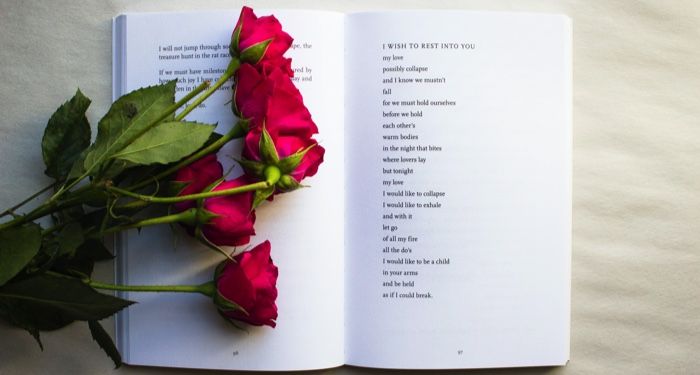
An English Professor’s Perspective on Hating Poetry
Lots of people are scared of poetry, and I’ve been thinking about why. I teach college-level Literature and Composition courses and always have some students who love poetry and a whole bunch who don’t. I’ve heard many people inside and outside the classroom say things like poetry is not for them, it’s intimidating, they don’t get it, it makes them feel stupid.
It doesn’t have to be this way! Kids love poetry and take to it naturally. I’m not sure they are even aware it’s poetry they are reading or having read to them. For them, it’s fun, a way to hear a good story or silly language and get attention from the grownup reading to them. Some older kids and teenagers read and write poetry to express feelings and be creative. Some people write poetry in the form of song lyrics or get into spoken word. Poetry for them is enjoyable, freeing, cathartic.

So what makes some people learn to be scared of it? Somewhere along the way, poetry goes from a form to be enjoyed to a subject to be analyzed. It becomes something you can be right or wrong about, not something to be experienced and explored. People are taught to think of poems as math problems, as an assignment they need to complete: go through the right steps, follow instructions, and they will end up with the right answer — the poem’s meaning. This attitude makes poetry boring: there’s only one meaning to this poem and my job is to find it. And it makes it scary — what if I’m wrong?
As an English professor, I will be the first to say that what happens in college classrooms is part of the problem (and perhaps what happens in high school classrooms is as well, but that’s something I’m less familiar with). I can see how the problem develops. My job is to help students learn how to be better readers and writers, and so it seems natural to focus on analysis, on breaking poems down into parts and searching for hidden meanings. I want them to learn the vocabulary necessary for understanding poetry — similes, rhyme schemes, alliteration, etc. — so they can get practice applying these terms and using them to find meaning. I want them to know — and my college wants them to know — how to write thesis statements and find evidence and form correct sentences and use quotations correctly.
And all these things are important and good! But the spirit of poetry gets lost somewhere in there. Poems become objects to craft arguments out of. We read them for evidence and proof of what we think they mean. We read them to write our essays, get our grades, and be done with the subject.
There are other reasons the teaching of poetry often doesn’t go well. It’s easy for professors to take on the role of “explainer,” the expert, the one who has the answers and is waiting for students to discover them. Now, yes, professor ARE experts, and that’s great, but using that expertise well is hard. I’ve been at the front of the classroom telling my class what a poem “means,” and have watched them dutifully take notes, all the while knowing they don’t get how I came to my conclusions, how I “saw” what I saw in the poem. What good does that do? It’s one thing if I’m teaching English majors about literary history, but in a class for non-majors, perhaps what they need is not me explaining what something means but me helping them find their own meaning. That requires giving up some control and losing my status as expert, and that’s hard. I’m working on it.
It’s also tempting for professors to pick poems that are complex and challenging, because those are ones we tend to like and the ones we have the most to say about. But those aren’t always the ones students love (although sometimes they are). On the other hand, I’ve had the experience of assigning more straightforward poems that students love, only to find that I have little to say about them. We talk for a few minutes about how much we like the poem…and then we’re done. Nothing wrong with that, but what do we do for the rest of the class period? There’s a built-in bias for more complicated readings that students are intimidated by because it gives professors something to do. It makes us feel like we’re doing our jobs. But maybe that’s the wrong focus entirely.
Poetry is about experiencing language more than understanding it, it’s about playing with language rather than mastering it, it’s about creativity and expression rather than knowledge. These are not things we emphasize in our classrooms! Schools teach us how to take tests, how to learn facts, how to organize an argument, how to research — all good things, except perhaps for tests — but they aren’t as good at teaching us how to experience and enjoy.
Schools definitely aren’t good at teaching us how to live with uncertainty, and I think that’s one of the best qualities to bring to a poem. If we let them, poems can teach us that it’s okay not to understanding something completely. It’s okay for language to mean many things at once, even contradictory things. It’s okay to enjoy something on a superficial level and then let it go (and maybe come back to it later for a deeper understanding, or maybe not). It’s okay to miss meaning entirely and just appreciate the way something sounds.
It’s too bad that schools become the main place people experience poetry, because poetry should be so much more than a school exercise. And it’s too bad that our educational systems don’t allow more room for fostering creativity and enjoyment. But it’s always possible to rediscover the joys of poetry, at any age. If you’re interested in reading more poetry but feel intimidated by it, then I recommend this really great article by fellow Book Rioter Isabelle Popp on how to get past that intimidation. Then check out our poetry archives for lots of great recommendations on where to find poetry you will love.














